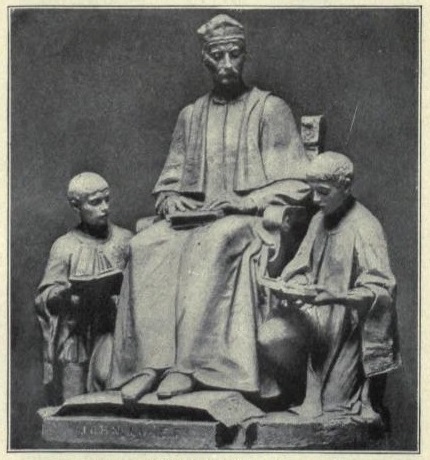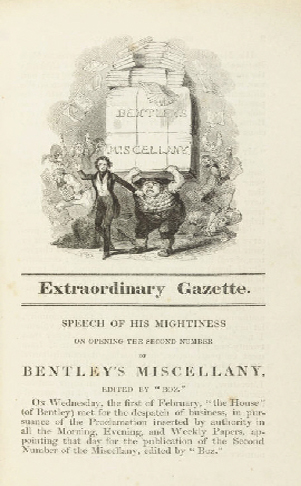|
Samuel Bentley
Samuel Bentley (1785–1868) was an English printer and antiquarian. Life The second son of Edward Bentley and his wife Anne Nichols, sister of John Nichols, he was born 10 May 1785; Richard Bentley the publisher was a younger brother. He was educated at St Paul's School, London, and after an apprenticeship with Nichols was taken into partnership. In 1819 Bentley went into partnership with his brother Richard, in Dorset Street, Salisbury Square; and on the latter taking over the business of Colburn, he established the firm of Samuel and John Bentley, Wilson, & Fley, at Bangor House, Shoe Lane, John being his nephew. He visited the type-foundry of Firmin Didot in Paris. With failing eyesight, Bentley gave up his business in 1853. He retired to Croydon, with his wife whom he had married in 1825. Works Bentley's major antiquarian work was the ''Excerpta Historica'' (1831), with which he had the assistance of Harris Nicolas, Sir Charles Young, Duffus Hardy, and others. He indexed ... [...More Info...] [...Related Items...] OR: [Wikipedia] [Google] [Baidu] |
John Nichols (printer)
John Nichols (2 February 1745 – 26 November 1826) was an English printer, author and antiquary. He is remembered as an influential editor of the ''Gentleman's Magazine'' for nearly 40 years; author of a monumental county history of Leicestershire; author of two compendia of biographical material relating to his literary contemporaries; and as one of the agents behind the first complete publication of Domesday Book in 1783. Early life and apprenticeship He was born in Islington, London to Edward Nichols and Anne Wilmot. On 22 June 1766 he married Anne, daughter of William Cradock. Anne bore him three children: Anne (1767), Sarah (1769), and William Bowyer (born 1775 and died a year later). His wife Anne also died in 1776. Nichols was married a second time in 1778, to Martha Green who bore him eight children. Nichols was taken for training by "the learned printer", William Bowyer the Younger in early 1757.Keith Maslen, ‘Bowyer, William (1699–1777)’, ''Oxford Dictionar ... [...More Info...] [...Related Items...] OR: [Wikipedia] [Google] [Baidu] |
John Colet
John Colet (January 1467 – 16 September 1519) was an English Catholic priest and educational pioneer. John Colet was an English scholar, Renaissance humanist, theologian, member of the Worshipful Company of Mercers, and Dean of St Paul's Cathedral, London. Colet wanted people to see the scripture as their guide through life. Furthermore, he wanted to restore theology and rejuvenate Christianity. Colet is an important early leader of Christian humanism as he linked humanism and reform. John Colet was a friend of Erasmus, a key figure in Christian humanism. Childhood and education The eldest son of Sir Henry Colet (Lord Mayor of London 1486 and 1495), he was born in London in January 1467, and was educated at St Anthony's school and at Magdalen College, Oxford, where he took his M.A. in 1490. He was already nonresident rector of Dennington, Suffolk, and vicar of St Dunstan's, Stepney, and now became rector of Thurning, Hunts. In 1493 he went to Paris and then to Italy, studyi ... [...More Info...] [...Related Items...] OR: [Wikipedia] [Google] [Baidu] |
English Antiquarians
English usually refers to: * English language * English people English may also refer to: Peoples, culture, and language * ''English'', an adjective for something of, from, or related to England ** English national identity, an identity and common culture ** English language in England, a variant of the English language spoken in England * English languages (other) * English studies, the study of English language and literature * ''English'', an Amish term for non-Amish, regardless of ethnicity Individuals * English (surname), a list of notable people with the surname ''English'' * People with the given name ** English McConnell (1882–1928), Irish footballer ** English Fisher (1928–2011), American boxing coach ** English Gardner (b. 1992), American track and field sprinter Places United States * English, Indiana, a town * English, Kentucky, an unincorporated community * English, Brazoria County, Texas, an unincorporated community ... [...More Info...] [...Related Items...] OR: [Wikipedia] [Google] [Baidu] |
1868 Deaths
Events January–March * January 2 – British Expedition to Abyssinia: Robert Napier leads an expedition to free captive British officials and missionaries. * January 3 – The 15-year-old Mutsuhito, Emperor Meiji of Japan, declares the '' Meiji Restoration'', his own restoration to full power, under the influence of supporters from the Chōshū and Satsuma Domains, and against the supporters of the Tokugawa shogunate, triggering the Boshin War. * January 5 – Paraguayan War: Brazilian Army commander Luís Alves de Lima e Silva, Duke of Caxias enters Asunción, Paraguay's capital. Some days later he declares the war is over. Nevertheless, Francisco Solano López, Paraguay's president, prepares guerrillas to fight in the countryside. * January 7 – The Arkansas constitutional convention meets in Little Rock. * January 9 – Penal transportation from Britain to Australia ends, with arrival of the convict ship '' Hougoumont'' in Wester ... [...More Info...] [...Related Items...] OR: [Wikipedia] [Google] [Baidu] |
1785 Births
Events January–March * January 1 – The first issue of the '' Daily Universal Register'', later known as ''The Times'', is published in London. * January 7 – Frenchman Jean-Pierre Blanchard and American John Jeffries travel from Dover, England to Calais, France in a hydrogen gas balloon, becoming the first to cross the English Channel by air. * January 11 – Richard Henry Lee is elected as President of the U.S. Congress of the Confederation.''Harper's Encyclopaedia of United States History from 458 A. D. to 1909'', ed. by Benson John Lossing and, Woodrow Wilson (Harper & Brothers, 1910) p167 * January 20 – Battle of Rạch Gầm-Xoài Mút: Invading Siamese forces, attempting to exploit the political chaos in Vietnam, are ambushed and annihilated at the Mekong River, by the Tây Sơn. * January 27 – The University of Georgia in the United States is chartered by the Georgia General Assembly meeting in Savannah. The first students are a ... [...More Info...] [...Related Items...] OR: [Wikipedia] [Google] [Baidu] |
Tower Of London
The Tower of London, officially His Majesty's Royal Palace and Fortress of the Tower of London, is a historic castle on the north bank of the River Thames in central London. It lies within the London Borough of Tower Hamlets, which is separated from the eastern edge of the square mile of the City of London by the open space known as Tower Hill. It was founded towards the end of 1066 as part of the Norman Conquest. The White Tower, which gives the entire castle its name, was built by William the Conqueror in 1078 and was a resented symbol of oppression, inflicted upon London by the new Norman ruling class. The castle was also used as a prison from 1100 ( Ranulf Flambard) until 1952 ( Kray twins), although that was not its primary purpose. A grand palace early in its history, it served as a royal residence. As a whole, the Tower is a complex of several buildings set within two concentric rings of defensive walls and a moat. There were several phases of expansion, mainly un ... [...More Info...] [...Related Items...] OR: [Wikipedia] [Google] [Baidu] |
John Sleath
John Sleath (1767–1847) was an English cleric and High Master of St Paul's School, London. He was elected a Fellow of the Royal Society in 1820. Life The son of William and Millicent Sleath, he was baptised on 19 June 1767 at Osgathorpe, Leicestershire; his elder brother, William Boultbee Sleath, was headmaster of Repton School from 1800 to 1832. He entered Rugby School in 1776, his parents being then described as of Leighton, near Kimbolton. In 1784 he went up as a Rugby exhibitioner to Lincoln College, Oxford, but in 1785 was elected to a scholarship at Wadham. He was Hody exhibitioner in 1786–7. He graduated B.A. in 1789, M.A. in 1793, B.D. and D.D. in 1814. In 1787, before taking his degree, Sleath was appointed to an assistant-mastership at Rugby School. Among his pupils there was Walter Savage Landor, who later wrote of him "elegant and generous". On 16 June 1814 Sleath was appointed High Master—headmaster—of St Paul's School, and was in post to 10 October 1837. Th ... [...More Info...] [...Related Items...] OR: [Wikipedia] [Google] [Baidu] |
Erasmus
Desiderius Erasmus Roterodamus (; ; English: Erasmus of Rotterdam or Erasmus;''Erasmus'' was his baptismal name, given after St. Erasmus of Formiae. ''Desiderius'' was an adopted additional name, which he used from 1496. The ''Roterodamus'' was a scholarly name meaning "from Rotterdam", though the Latin genitive would be . 28 October 1466 – 12 July 1536) was a Dutch philosopher and Catholic theologian who is considered one of the greatest scholars of the northern Renaissance.Gleason, John B. "The Birth Dates of John Colet and Erasmus of Rotterdam: Fresh Documentary Evidence", Renaissance Quarterly, The University of Chicago Press on behalf of the Renaissance Society of America, Vol. 32, No. 1 (Spring, 1979), pp. 73–76www.jstor.org/ref> As a Catholic priest, he was an important figure in classical scholarship who wrote in a pure Latin style. Among humanists he was given the sobriquet "Prince of the Humanists", and has been called "the crowning glory of the Christian human ... [...More Info...] [...Related Items...] OR: [Wikipedia] [Google] [Baidu] |
Richard Bentley (publisher)
Richard Bentley (24 October 1794 – 10 September 1871) was a 19th-century English publisher born into a publishing family. He started a firm with his brother in 1819. Ten years later, he went into partnership with the publisher Henry Colburn. Although the business was often successful, publishing the famous "Standard Novels" series, they ended their partnership in acrimony three years later. Bentley continued alone profitably in the 1830s and early 1840s, establishing the well-known periodical '' Bentley's Miscellany''. However, the periodical went into decline after its editor, Charles Dickens, left. Bentley's business started to falter after 1843 and he sold many of his copyrights. Only 15 years later did it begin to recover. Early life Bentley came from a publishing family that stretched back three generations. His father, Edward Bentley, and his uncle, John Nichols, published the '' General Evening Post'', and Nichols also published the ''Gentleman's Magazine''.Wallins, 40 ... [...More Info...] [...Related Items...] OR: [Wikipedia] [Google] [Baidu] |
Robert Surtees (antiquarian)
Robert Surtees (1 April 1779 – 13 February 1834) was a celebrated English historian and antiquary of his native County Durham. Early life Surtees was born in South Bailey, Durham on 1 April 1779. He was the only surviving child of Dorothy Surtees (d. 1797) and Robert Surtees of Mainsforth (d. 1802), who were first cousins. His maternal grandparents were Robert Surtees of Redworth Hall, and the former Dorothy Lambton (second daughter of Thomas Lambton of Hardwick). His aunt, Jane Surtees (co-heiresses of their father Robert Surtees), also married a first cousin, Lt. Crosier Surtees, who died in 1803 when returning from a banquet with Lord Barnard at Raby Castle when he drunkenly fell into the moors and froze to death. They were grandparents of Henry Surtees, who inherited Redworth Hall, and Charles Surtees, who eventually inherited Mainsforth Hall. He was educated at Kepier School, Houghton-le-Spring, and later at Christ Church, Oxford, graduating with a B.A. degree i ... [...More Info...] [...Related Items...] OR: [Wikipedia] [Google] [Baidu] |




.jpg)

